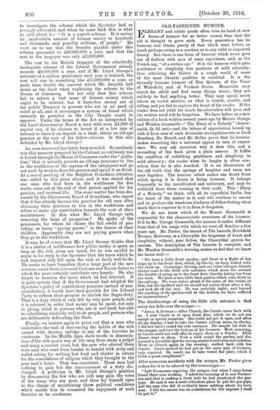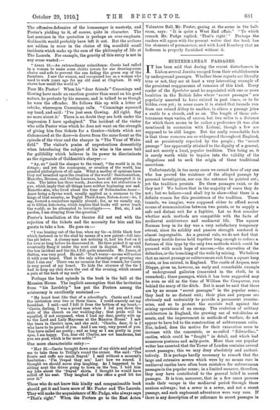OLD-FASHIONED HUMOUR. E LEGANT and subtle youth often tries its hand
at new forms of humour for no better reason than that the old is thought to grow stale. Every generation has its humour, and thinks poorly of that which went before, as
much perhaps owing to a reaction as to any valid or improved theory. But there is one form of humour which never goes out of fashion with men of some experience, and, as the French say, "of a certain age." It is the humour which puts
gentleness or simplicity into positions of mild adversity, thus criticising the failure in a rough world of some of the most likeable qualities in mankind. It is the eternally humane humour of Don Quixote, of the Vicar
of Wakefield, and of Verdant Green. Humorists may search far afield and find many things worse; they are unlikely to find anything better. They may spend much labour on verbal niceties, on what is nimble, caustic, and telling, and yet fail to capture the heart of the reader. If the reader does not yield his bean, his admiration will pass, and the written word will be forgotten. We have before us a new edition of a book written several years ago by Messrs. George and Weedon Grossmith—" The Diary of a Nobody" (Arrow- smith, 2s. 6d. net)—a.nd the letters of appreciation bound up with it from men of such dissimilar accomplishments as Lord Rosebery, Mr. Birrell, and Mr. Belloc prove that its humour makes something like a universal appeal to men of experi- •
ence. We may ask ourselves why it does this, and a re-reading of the book gives a plain answer. It fulfils
the condition of exhibiting gentleness and simplicity in mild adversity ; the reader when he laughs is often con- scious that he is also touched. It is an illustration of the old truth that the springs of laughter and tears are near together. The humour which makes one doubt from which spring it is drawn is living humour. It belongs frequently to the uncultivated and unliterary, and may be withheld from those cunning in their craft. This "Diary of a Nobody," we think, with all its superficial faults, has the heart of the matter in it, and will continue to amuse and to produce the wondrous kindness of fellow-feeling when much that is superior to it in form is forgotten.
We do not know which of the Messrs. Grossmith is responsible for the characteristic sweetness of the humour. If it be Mr. George Grossmith, the manner is rather different from that of his songs with which we were all familiar a few years ago. Mr. Footer, the tenant of The Laurels, Brickfield Terrace, Holloway, is a Cheeryble for largeness of heart and simplicity, without, poor fellow, the Cheerybles' genius for success. Tbe description of The Laurels is complete, and Mr. Weedon Grossmith's drawing makes us feel that we know the house well
"We have a little front garden; and there is a flight of ten steps up to the front door, which, by-the-by, we keep locked with the chain up. Cummings, Gowing, and our other intimate friends always come to the little side entrance, which saves the servant the trouble of going up to the front door, thereby taking her from her work. We have a nice little back garden which runs down to the railway. We were rather afraid of the noise of the trains at first, but the landlord said we should not notice them after a bit, and took £2 off the rent. He was certainly right; and beyond the cracking of the garden-wail at the bottom, we have suffered no inconvenience."
The disadvantage of using the little side entrance is that every one falls over the scraper :— " APRIL 8, Suwwer.—After Church, the Curate came back with us. I sent Carrie in to open front door, which we do not use except on special occasions. She could not get it open, and after all my display, I had to take the Curate (whose name, by-the-by, I did not catch) round the side entrance. He caught his foot in the scraper, and tore the bottom of his trousers. Most annoying, as Carrie could not well offer to repair them on a Sunday. After dinner went to sleep. Took a walk round the garden, and dis- covered a beautiful spot for sowing mustard-and-cress and radishes, Went to Church again in the evening : walked back with the Curate. Carrie noticed be had got on the same pair of trousers, only repaired. He wants me to take round the plate, which I think a great compliment."
.Alter numerous accidents with the scraper, Mr. Pooter gives orders for it to be altered by the ironmonger:— " Left Farmerson repairing the scraper, but when I came home found three men working. I asked the meaning of it, and Farmer- son said that in making a fresh hole he bad penetrated the gas- pipe. He said it was a most ridiculous place to put the gas-pipe, and the man who did it evidently knew nothing about his busi- ness. I felt his excuse was no consolation for the expense I shall be put to."
The offensive-defensive of the ironmonger is masterly, and Pooter's yielding to it, of course, quite in character. The last sentence in the quotation is perhaps an over-emphasis. Goldsmith would probably have left it out. Bat the authors are seldom in error in the choice of th% manifold small incidents which make up the sum of the philosophy of life at The Laurels. For example, the gravity of this entry is not in any sense wasted
"APIL 13.—An extraordinary coincidence : Carrie had called in a woman to make some chintz covers for our drawing-room chairs and sofa to prevent the sun fading the green rep of the furniture. I saw the woman, and recognised her as a woman who used to work years ago for my old aunt at Clapham. It only shows how small the world is."
Poor Mr. Pooter ! When his "dear friends" Cummings and Gowing have made an exaction greater than usual on his good nature, he protests by his manner, and is talked to as though he were the offender. He follows this up with a letter of rebuke, whereupon Cummings calls. "Cummings squeezed my hand, and said : I've just seen Gowing. All right. Say no more about it.' There is no doubt they are both under the impression I have apologised." The incident of the visitor who sells Pooter wine which he does not want on the strength of giving him free tickets for a theatre—tickets which are dishonoured at the door—is drawn from the same fount as the episode of the vicar and the sharper in "The Vicar of Wake- field." The visitor's praise of unpretentious domesticity when introducing the subject of his wine is the same bait for gullibility which believes in its power to discriminate as the rigmarole of Goldsmith's sharper :— " Ay, sir" (said the sharper to the vicar), "the world is in its dotage ; and yet the cosmogony, or creation of the world, has puzzled philosophers of all ages. What a medley of opinions have they not broached upon the creation of the world ! Sanchoniathon, M.anetho, Berosus, and Oeellus Lucanns, have all attempted it in vain. The latter has these words, Anarehon are kai ateteutaion to ran, which imply that all things have neither beginning nor end. Manetho also, who lived about the time of Nebuchadon-Asser- Asser being a Syriac word, usually applied as a surname to the kings of that country, as Teglat Phitel-Asser, Nabon-Asser—he, I say, formed a conjecture equally absurd ; for, as we usually say, ek to biblion kubernetes, which implies that books will never teach the world; so he attempted to investigate—. But, sir, I ask pardon, I am straying from the question.'
Pooter's humiliation at the theatre did not end with the rejection of the tickets and the necessity for him and his guests to take a box. He goes on :—
"I was leaning out of the box, when my tie—a little black bow which fastened on to the stud by means of a new patent—fell into the pit below. A clumsy man not noticing it, had his foot on it for ever so long before he discovered it. He then picked it up and eventually flung it under the next seat in disgust. What with the box incident and the tie, I felt quite miserable. Mr. James, of Sutton' was very good. He said: Don't worry—no one will notice it with your beard. That is the only advantage of growing one that I can see.' There was no occasion for that remark, for Carrie is very proud of my beard. To hide the absence of the tie I had to keep my chin down the rest of the evening, which caused a pain at the back of my neck."
Perhaps the best episode in the book is the ball at the Mansion House. The implicit assumption that the invitation from "his Lordship" has put the Pooters among the aristocracy is excellently sustained :—
" My heart beat like that of a schoolboy's. Carrie and I read the invitation over two or three times. I could scarcely eat my breakfast. I said—and I felt it from the bottom of my heart,— ' Carrie, darling, I was a, proud man when I led you down the aisle of the church on our wedding-day; that pride will be equalled, if not surpassed, when I lead my dear, pretty wife up to the Lord and Lady Mayoress at the Mansion House., I saw the tears in Carrie's eyes, and she said : Charlie, dear, it is I who have to be proud of you. And I am very, very proud of you. You have called me pretty; and as long as I am pretty in your eyes, I am happy. You, dear old Charlie, are not handsome, but you are good, which is far more noble."
One more characteristics entry :—
" MAY 25.—Carrie brought down some of my shirts and advised me to take them to Trillip's round the corner. She said: 'The fronts and cuffs are much frayed.' I said without a moment's hesitation: 'I'm 'frayed they are.' Lor 1 how we roared. I thought we should never stop laughing. As I happened to be sitting next the driver going to town on the 'bus, I told him my joke about the frayed shirts. I thought he would have rolled off his seat. They laughed at the office a good bit too over it."
Those who do not know this kindly and companionable book should get it and. learn more of Mr. Pooter and The Laurels. They will make the acquaintance of Mr. Padge, who always says "That's right." When the Footers go to the East Acton
Volunteer Ball, Mr. Pooter, gazing at the scene in the ball- room, says : "It is quite a West End affair." "To which remark Mr. Padge replied, That's right.'" Perhaps the readers will agree with the present writer that the book has the elements of permanence, and with Lord Rosebery that no bedroom is properly furnished without it.















































 Previous page
Previous page